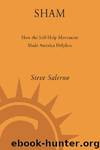Sham: How the Self-Help Movement Made America Helpless by Steve Salerno

Author:Steve Salerno [Salerno, Steve]
Language: eng
Format: mobi
Publisher: Crown
Published: 2005-06-20T14:00:00+00:00
RECOVERY’S LONG SHADOW
Though in recent years the rise of SHAM’s Empowerment wing has dulled some of Recovery’s luster, the movement’s effects continue to be strongly felt. We see its shadow most prominently in the culture of blame that has been sold to an audience eager to excuse its own failings; the legacy of that philosophical bottom-feeding surely will be with us for decades to come. We see it in the justice system, in educational policy, in child-rearing protocols, in marriage counseling—in too many meaningful areas of modern life to cover in just one book. It turns up in the melancholic language of political demagoguery, and even in mainstream campaign rhetoric. The most compelling political slogans of recent vintage—“Are you better off today than you were four years ago?”—would not have flown as well in the 1950s, when Americans had not yet been trained to consider their own plight in terms of federal beneficence. “Once upon a time, if you weren’t ‘better off,’ you wouldn’t have looked to Washington for an answer,” the late historian Stephen Ambrose told me when I was publisher of the American Legion magazine and he was one of our marquee writers. “It wouldn’t have occurred to you to think of your station in life in the context of government policy. For better or worse, it was your life, and you owned it.”
Times change. Many of us now renounce ownership of our lives. And so if we’ve had trouble getting married or staying married, or getting along with people, or staying employed; if we smoke or drink or shoot up; if we beat our kids or wives or girlfriends, or have both a wife and a girlfriend; if we drive too fast, shop too much, defer too often to those around us; if, despite all that fast driving, we can’t get to work or other appointments on time, then—we’ve been conditioned to think—it’s because we have something inside of us over which we have no control, or because someone else did something to us from which we and our inner children never quite recovered. Our neighbors have been encouraged to accept us in our state of weakness or dissolution, just as we have been encouraged to accept them.
You say you don’t remember anything terrible being done to you as a child? You’re in denial. You’re repressing, which is framed as a dysfunction in its own right, so you’re damned if you do, damned if you don’t. The late 1980s and 1990s witnessed the astonishing rise of “repressed memory syndrome,” wherein great hordes of reasonably well-functioning adults who had never before recalled a single moment of childhood trauma suddenly began recalling, en masse and in great detail, lengthy patterns of childhood abuse. Dozens of women and some men prosecuted or sued their aging fathers, uncles, brothers, babysitters, teachers, or other authority figures from their pasts. In some cases the targets of this retroactive scrutiny admitted a degree of guilt. In other cases, however, the memory itself proved spurious—either
Download
This site does not store any files on its server. We only index and link to content provided by other sites. Please contact the content providers to delete copyright contents if any and email us, we'll remove relevant links or contents immediately.
Nudge - Improving Decisions about Health, Wealth, and Happiness by Thaler Sunstein(6633)
Deep Work by Cal Newport(5461)
Principles: Life and Work by Ray Dalio(5321)
The Doodle Revolution by Sunni Brown(4042)
Factfulness: Ten Reasons We're Wrong About the World – and Why Things Are Better Than You Think by Hans Rosling(4021)
Thinking in Bets by Annie Duke(3530)
Eat That Frog! by Brian Tracy(3512)
Writing Your Dissertation in Fifteen Minutes a Day by Joan Bolker(3298)
Visual Intelligence by Amy E. Herman(3281)
Hyperfocus by Chris Bailey(3267)
How to win friends and influence people by Dale Carnegie(2826)
How to Win Friends and Influence People in the Digital Age by Dale Carnegie & Associates(2818)
Schaum's Quick Guide to Writing Great Short Stories by Margaret Lucke(2800)
Hidden Persuasion: 33 psychological influence techniques in advertising by Marc Andrews & Matthijs van Leeuwen & Rick van Baaren(2777)
The Pixar Touch by David A. Price(2739)
Ogilvy on Advertising by David Ogilvy(2682)
The Slow Fix: Solve Problems, Work Smarter, and Live Better In a World Addicted to Speed by Carl Honore(2574)
Work Clean by Dan Charnas(2562)
The Content Trap by Bharat Anand(2493)
